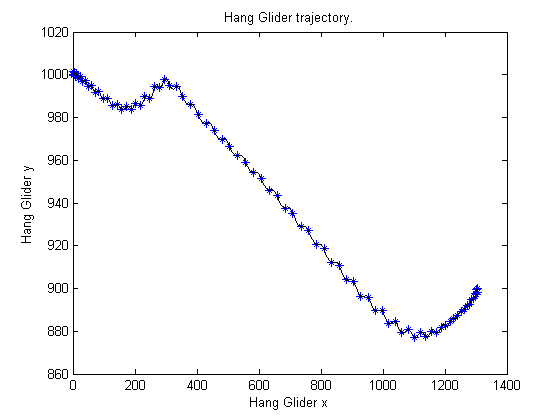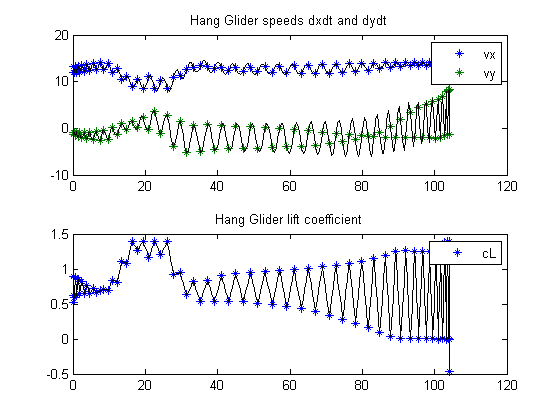Hang Glider Control
Benchmarking Optimization Software with COPS Elizabeth D. Dolan and Jorge J. More ARGONNE NATIONAL LABORATORY
Contents
Problem Formulation
Find u(t) over t in [0; tF ] to maximize

subject to:






















![$$ [x_0 \ y_0] = [0 \ 1000] $$](xhangGlider_eq81732.png)
![$$ [y_{t_f}] = 900 $$](xhangGlider_eq05981.png)
![$$ [\frac{dx}{dt}_0 \ \frac{dy}{dt}_0] = [13.23 \ -1.288] $$](xhangGlider_eq48879.png)
![$$ [\frac{dx}{dt}_{t_f} \ \frac{dy}{dt}_{t_f}] = [13.23 \ -1.288] $$](xhangGlider_eq14460.png)
cL is the control variable.
% Copyright (c) 2007-2008 by Tomlab Optimization Inc.
Problem setup
toms t toms tf for n=[10 80]
p = tomPhase('p', t, 0, tf, n, [], 'cheb'); setPhase(p); tomStates x dx y dy tomControls cL % Initial guess % Note: The guess for tf must appear in the list before % expression involving t. if n == 10 x0 = {tf == 105 icollocate({ dx == 13.23; x == dx*t dy == -1.288; y == 1000+dy*t }) collocate(cL==1.4)}; else x0 = {tf == tf_opt icollocate({ dx == dx_opt; x == x_opt dy == dy_opt; y == y_opt }) collocate(cL == cL_opt)}; end % Box constraints cbox = { 0.1 <= tf <= 200 0 <= icollocate(x) 0 <= icollocate(dx) 0 <= collocate(cL) <= 1.4}; % Boundary constraints cbnd = {initial({x == 0; dx == 13.23 y == 1000; dy == -1.288}) final({dx == 13.23; y == 900; dy == -1.288})}; % Various constants and expressions m = 100; g = 9.81; uc = 2.5; r0 = 100; c0 = 0.034; c1 = 0.069662; S = 14; rho = 1.13; r = (x/r0-2.5).^2; u = uc*(1-r).*exp(-r); w = dy-u; v = sqrt(dx.^2+w.^2); sinneta = w./v; cosneta = dx./v; D = 1/2*(c0+c1*cL.^2).*rho.*S.*v.^2; L = 1/2*cL.*rho.*S.*v.^2; % ODEs and path constraints ceq = collocate({ dot(x) == dx dot(dx) == 1/m*(-L.*sinneta-D.*cosneta) dot(y) == dy dot(dy) == 1/m*(L.*cosneta-D.*sinneta)-g dx.^2+w.^2 >= 0.01}); % Objective objective = -final(x);
Solve the problem
options = struct;
options.name = 'Hang Glider';
solution = ezsolve(objective, {cbox, cbnd, ceq}, x0, options);
Problem type appears to be: lpcon
===== * * * =================================================================== * * *
TOMLAB - Tomlab Optimization Inc. Development license 999001. Valid to 2010-02-05
=====================================================================================
Problem: --- 1: Hang Glider f_k -1281.388593956428200000
sum(|constr|) 0.000000000068965670
f(x_k) + sum(|constr|) -1281.388593956359300000
f(x_0) -1389.149999999998700000
Solver: snopt. EXIT=0. INFORM=1.
SNOPT 7.2-5 NLP code
Optimality conditions satisfied
FuncEv 1 ConstrEv 69 ConJacEv 69 Iter 48 MinorIter 225
CPU time: 0.265625 sec. Elapsed time: 0.266000 sec.
Problem type appears to be: lpcon
===== * * * =================================================================== * * *
TOMLAB - Tomlab Optimization Inc. Development license 999001. Valid to 2010-02-05
=====================================================================================
Problem: --- 1: Hang Glider f_k -1305.253702077172000000
sum(|constr|) 0.000000043627467339
f(x_k) + sum(|constr|) -1305.253702033544400000
f(x_0) -1281.388593956420700000
Solver: snopt. EXIT=0. INFORM=1.
SNOPT 7.2-5 NLP code
Optimality conditions satisfied
FuncEv 1 ConstrEv 80 ConJacEv 80 Iter 67 MinorIter 1182
CPU time: 4.125000 sec. Elapsed time: 4.172000 sec.
Extract optimal states and controls from solution
x_opt = subs(x,solution);
dx_opt = subs(dx,solution);
y_opt = subs(y,solution);
dy_opt = subs(dy,solution);
cL_opt = subs(cL,solution);
tf_opt = subs(tf,solution);
end
Plot result
figure(1) ezplot(x,y); xlabel('Hang Glider x'); ylabel('Hang Glider y'); title('Hang Glider trajectory.'); figure(2) subplot(2,1,1) ezplot([dx; dy]); legend('vx','vy'); title('Hang Glider speeds dxdt and dydt'); subplot(2,1,2) ezplot(cL); legend('cL'); title('Hang Glider lift coefficient');

